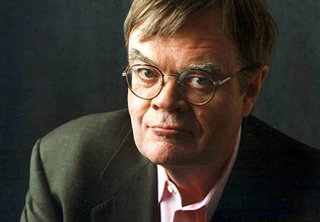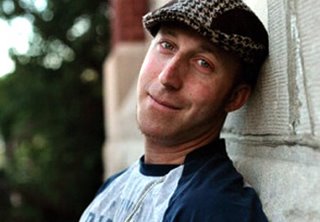
As much as I remember learning how to write a persuasive essay in 8th grade English, I don't exactly remember the core tenants of crafting such a document. Still, I think I kind of nailed it here.
I've been drafting this response since Mr. Moyers emailed us last week to say no thanks, reading and re-reading, writing and re-writing, until just a few seconds ago when I finally hit "Send."
Dear Mr. Moyers:
I appreciate your thoughtful response, and understandable reticence to participate in our documentary, "Mister Rogers & Me." Your "retirement” must be the most productive and least restful in the history of television. Still, I’m sure that I was not alone cheering the news of your return to PBS. Your truth seeking is more valuable now than ever, as you demonstrated again with your fiery, spot-on speech at The National Conference For Media Reform.
Your thesis there -- that media consolidation, the sale of politics, and the widening gap between rich and poor have narrowed the message so that "what we see from the couch is overwhelmingly a view from the top" -- is central to our film's exploration of accelerated culture's shallowness, and complexity.
Mr. Moyers, I am not alone in considering your wisdom a key component to any well-rendered exploration of depth and substance. Last week, at the conclusion of an interview for our film, Linda Ellerbee said -- unprompted -- "You should really talk to Bill Moyers. Nobody gets this stuff better than him."
Because you are so thoroughly and understandably over-committed, though, please consider speaking with us for just five minutes anytime between now and June 1 at the location of your choice. It could be a stand-up on a street corner, a press event -- anything, anytime, anywhere.
Fred Rogers' 1969 congressional testimony helped secure $20M in funding in support of the fledgling Corporation for Public Broadcasting. Likewise, your intellectual capital will lend considerable heft to the coffers of our documentary's argument.
You once said "God works in the wedges, through the cracks, along the fault line of schisms, until conformity and orthodoxy can no longer hold the mind hostage to habit or the spirit captive." To that end, Mr. Moyers, I appeal to you avail us just five minutes to lend aid to our small but soulful effort to fight the good fight.
Most Sincerely,
Benjamin Wagner
The last quote -- an excerpt of his retirement dinner of University of Durham Lightfoot Professor of Divinity James Dunn -- absolutely floored me. Great acts, seismic upheavals begin in small and mysterious ways.
It reminded me of Bo's story about angels and crack in the firmament. Chris and I had spent all day with Bo, pacing the grounds of the Human Kindness commune. Our minds were blown by the depth and breadth of Bo's work, and insight. He told us this story just as the sun was settling over the North Carolina hills.
At one point in C.S. Lewis', The Great Divorce, he says to this angelic guy, "If you angels are so full of compassion, and have a world so full of compassion, why aren’t you down there on earth? Everybody is so miserable down there."
And the angel says, "You see that little crack in the Earth near you foot that the ants are crawling in?”
And C.S. Lewis looks down and he says, "Yes."
And the angel says, "You're entire world, everything you call your universe, all of the history, future, from dinosaurs to the end of the world -- it’s all in that little crack. There's only been one of us that's had the ability to fit down there."
And of course he’s talking about Jesus Christ.
So he says, "We have to wait until you are willing to grow. We just can’t fit."
I’ve seen in my own mystical experiences, and I think it’s a very relevant metaphor. This world of good and evil is in that crack at your foot. And this world of eternal goodness, of holiness, is like the size of the sun. It's the size of the galaxy.





